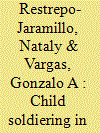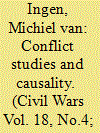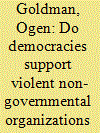| Srl | Item |
| 1 |
ID:
152101


|
|
|
|
|
| Summary/Abstract |
Child soldiering remains a challenge for the international community, and non-state armed groups are the most persistent offenders, but its drivers are poorly understood. Recent contributions suggest that decisions by armed groups are the key to explain child soldiering and that contextual variables are less relevant. This article exploits the availability of subnational, longitudinal data on child soldiering in Colombia, where insurgents and private militias have recruited children at least since the 1990s. The analysis shows that child recruitment is more likely in poorer municipalities, with limited access to education, and where coca crops are grown.
|
|
|
|
|
|
|
|
|
|
|
|
|
|
|
|
| 2 |
ID:
152098


|
|
|
|
|
| Summary/Abstract |
he study of civil war has increased exponentially during the post-cold war period. This has not, however, resulted in greater levels of consensus with regard to the causes and nature of this phenomenon. In order to alleviate this situation the current article will draw on critical realist philosophy. It will argue (1) that critical realism provides conflict studies authors with a more sophisticated and coherent understanding of causality than has previously been available to them, and (2) that this understanding paves the way for an approach to social science which – rather than consistently abstracting from context – systematically engages with it.
|
|
|
|
|
|
|
|
|
|
|
|
|
|
|
|
| 3 |
ID:
152100


|
|
|
|
|
| Summary/Abstract |
This study draws attention to the question: Do democracies fight indirectly through material support to violent non-governmental organizations (VNGOs) which wage intrastate war against other states in general and against democracies in particular, or are democracies less warlike by proxy? The main conclusions are: democracies are less warlike by proxy than non-democratic states, and the more democratic the regime the lower the probability that it will support VNGOs waging war against other states, both in general and against other democracies in particular. The results do not unequivocally support both the monadic or dyadic argument of democratic peaceful behaviour
|
|
|
|
|
|
|
|
|
|
|
|
|
|
|
|
| 4 |
ID:
152099


|
|
|
|
|
| Summary/Abstract |
Understanding why and when states militarily intervene in civil wars is crucial. Intervention can increase civil wars’ severity and the strategies employed in civil wars are shaped by the possibility of military intervention. This article argues that potential military interveners react to information revealed about warring parties’ intentions and relative power. Without revealed information, potential military interveners are unlikely to reconsider their initial decision to remain out of the war. Revealed information causes non-belligerent states to update their expectations about the trajectory of the civil war causing them, at times, to change their calculus about the benefits of belligerency and thus intervene. This helps explain why civil wars spread and when they do so. This explanation is tested using generalised estimating equations on a new data-set of unexpected events for the civil wars in the Correlates of War Intrastate War and PRIO Armed Conflict data-sets.
|
|
|
|
|
|
|
|
|
|
|
|
|
|
|
|
| 5 |
ID:
152102


|
|
|
|
|
| Summary/Abstract |
This paper examines how fragile Bosnia and Herzegovina (BiH) is and whether it is indeed in danger of collapsing, as significant amount of academic literature often claims. The research finds that BiH is not in an immediate danger of collapse. BiH remains peaceful, despite the numerous challenges it faces. However, it comprises an alarming amount of causes of conflict that have been mitigated because both international actors and local elites benefit from the current status quo. Thus, BiH finds itself in a peaceful stalemate, which is likely to continue until a structural change occurs that triggers the outbreak of violent conflict.
|
|
|
|
|
|
|
|
|
|
|
|
|
|
|
|